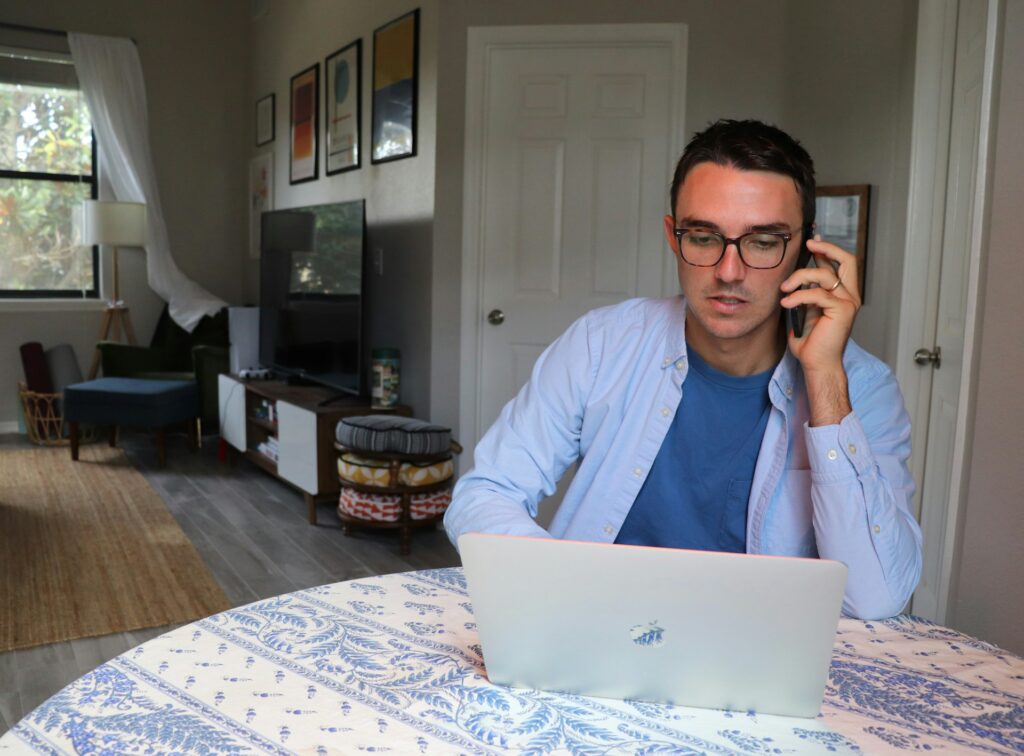Loneliness doesn’t always look like sadness (though it obviously does sometimes).

More often, though, it hides behind routines and behaviours that seem totally normal—sometimes even enviable. People who feel disconnected often go out of their way to look fine. It’s not because they’re trying to be fake, but because the alternative feels vulnerable or hard to explain. Here are some things lonely people often do to seem okay when they’re quietly anything but.
1. Overloading their schedule so they never have to sit still

It can look like ambition or high energy, but filling every second of the day is often a way to outrun stillness. Because when things go quiet, the loneliness creeps in louder. Staying busy becomes a buffer between them and the reality they’re avoiding. They’ll run errands that could wait, take on tasks no one asked for, and say yes to things they’re not even excited about. They’re not trying to be productive—they’re avoiding ever having to sit alone with their thoughts.
2. Talking about their independence like it’s a lifestyle choice

There’s a difference between enjoying your own company and trying to convince yourself you don’t mind the silence. When lonely people say “I just love doing things alone,” it’s sometimes code for “I’ve got used to being on my own because I had to.” Framing isolation as independence makes it sound strong, even if it doesn’t feel that way deep down. It’s a story that protects them from pity, and from having to admit they wish things were different.
3. Making jokes about being single or left out

Humour is a great cover. A lonely person might constantly make themselves the punchline, especially around topics that hit close to home. It takes the sting out of the situation and keeps people from asking more questions. They’ll laugh about being the last one to be picked or how they always eat dinner alone because if they joke about it first, no one else has to. It feels safer to laugh than to say, “Actually, this kind of hurts.”
4. Overposting on social media to look connected

They might look like they’re living a full life—stories, selfies, throwbacks—but sometimes it’s more about filling a void than capturing a moment. Posting becomes a stand-in for interaction when real connection feels out of reach. It’s not about showing off. It’s about wanting to feel seen, even if only briefly. A heart react, a comment, a little validation—it all helps quiet the part of them that wonders if anyone’s noticed how quiet things have really been.
5. Always offering help but never asking for any

They’re the first to offer support, drop everything, and show up for other people. Helping gives them purpose and makes them feel needed, but asking for help themselves? That’s where it gets tricky. Lonely people often feel like they’ll be a burden if they open up. So they stick to giving, quietly hoping that someone will notice their effort and check in—not because they asked, but because they mattered enough without having to.
6. Saying “I’m just tired” when they mean “I feel low”

Tired is easy. It’s socially acceptable and doesn’t raise red flags. Most people will nod, say “same,” and move on. However, when someone’s always tired, it can be a sign of something deeper than just needing sleep. It becomes shorthand for emotional exhaustion, emptiness, or quiet sadness. They’re not lying—they just know that “tired” is easier to hear than “I feel like I don’t matter right now.”
7. Going quiet for days and pretending it’s normal

They’ll disappear off the grid for a bit—no texts, no replies, no updates—and then come back like nothing happened. It’s not personal. They just needed to retreat without having to explain why. When they do resurface, they often brush it off. “Oh, just busy.” But really, they were overwhelmed by how alone they felt and didn’t know how to ask for connection without it sounding like a plea.
8. Acting like they prefer digital over in-person interaction

It’s easy to say, “I’d rather text than go out,” but sometimes that’s just fear disguised as preference. Being in a room with people can feel intimidating when you already feel separate from them. So they stick to the safety of screens—where they can curate responses, manage how much they share, and step away when it gets too much. It’s not antisocial. It’s protective distance, disguised as introversion.
9. Using sarcasm to shut down emotional conversations

They might deflect with a joke when the conversation gets too real. Not because they don’t care—but because they do, maybe more than they want to admit. Vulnerability feels risky, so sarcasm becomes the detour. They’ve probably been open in the past and didn’t get the response they needed. So now they’d rather keep things surface-level, even if part of them is desperate to be heard underneath it all.
10. Filling every silence with over-talking

Sometimes, lonely people become the most talkative ones in the room. Not because they’re trying to dominate the conversation, but because silence feels like a spotlight. If no one’s speaking, their insecurities get louder. So they fill the gaps. They tell stories, ask questions, keep things moving—anything to avoid the quiet moment where someone might notice how disconnected they actually feel.
11. Celebrating small wins a little too loudly

Every new recipe, minor work win, or tidy corner of their flat might show up in conversation or online. It’s not attention-seeking; it’s a way to inject meaning into a day that otherwise felt pretty empty. When loneliness is constant, even tiny victories feel worth spotlighting. It’s their way of saying, “Something good happened today, and I want to believe it mattered.” Even if it’s just to them.
12. Framing their alone time as “thriving solo”

They’ll talk about being in their “solo era” or loving their own space, but sometimes, it’s just a softer way of admitting no one’s really around. They want to believe it’s a choice, not a consequence. Sometimes it is, but other times, it’s a coping mechanism—rebranding the isolation so it doesn’t feel like something’s missing. When you feel alone, calling it freedom helps you make peace with it.
13. Avoiding emotionally open people

Being around someone who talks openly about their feelings can be tough when you’re trying to keep yours buried. It’s not that they don’t want connection—it’s that they’re scared of what might come up if they let their guard down. So they avoid the deep-feelers, stick to safe conversations, and keep things light. It’s easier to manage that way. Emotional closeness feels dangerous when you don’t know how to ask for it or handle it if it comes.
14. Convincing themselves it’s “just a phase”

They’ll tell themselves they’re just busy, or that everyone else is too. That the disconnect is temporary. That it’ll pass. Because believing that is easier than accepting the loneliness might stick around longer than they want it to. Calling it a phase gives them hope—something to hold onto. It helps them feel like they’re still in motion, even if nothing’s really changed. And sometimes, that story is what keeps them going.


